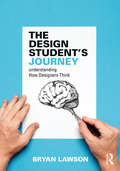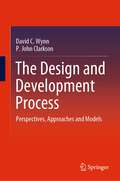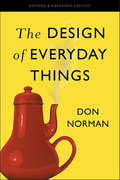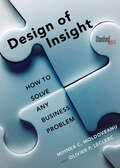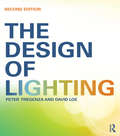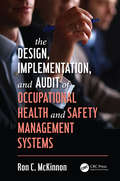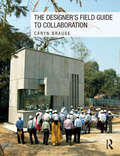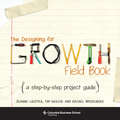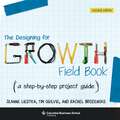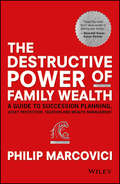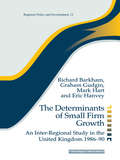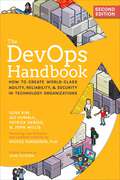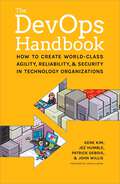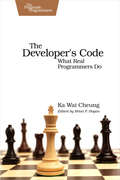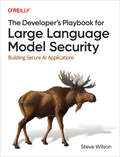- Table View
- List View
The Design Student's Journey: understanding How Designers Think
by Bryan LawsonBeing a professional designer is one of the most intellectually rewarding careers. Learning to become a designer can be tremendous fun but it can also be frustrating and at times painful. What you have to do to become a designer is not often clearly laid out and can seem mysterious. Over the past 50 years or so we have discovered a great deal about how designers think. This book relies upon that knowledge but presents it in a way specifically intended to help the student and perhaps the teacher. Bryan Lawson’s classic book How Designers Think has been in print since 1980 and has gone through four editions to keep it up to date. This book can be seen as a companion volume for the design student.
The Design Thinking Playbook: Mindful Digital Transformation of Teams, Products, Services, Businesses and Ecosystems
by Larry Leifer Michael Lewrick Patrick LinkA radical shift in perspective to transform your organization to become more innovative The Design Thinking Playbook is an actionable guide to the future of business. By stepping back and questioning the current mindset, the faults of the status quo stand out in stark relief—and this guide gives you the tools and frameworks you need to kick off a digital transformation. Design Thinking is about approaching things differently with a strong user orientation and fast iterations with multidisciplinary teams to solve wicked problems. It is equally applicable to (re-)design products, services, processes, business models, and ecosystems. It inspires radical innovation as a matter of course, and ignites capabilities beyond mere potential. Unmatched as a source of competitive advantage, Design Thinking is the driving force behind those who will lead industries through transformations and evolutions. This book describes how Design Thinking is applied across a variety of industries, enriched with other proven approaches as well as the necessary tools, and the knowledge to use them effectively. Packed with solutions for common challenges including digital transformation, this practical, highly visual discussion shows you how Design Thinking fits into agile methods within management, innovation, and startups. Practical frameworks, real-world solutions, and radical innovation wrapped in a whole new outlook give you the power to mindfully lead to new heights. From systems and operations to people, projects, culture, digitalization, and beyond, this invaluable mind shift paves the way for organizations—and individuals—to do great things. When you’re ready to give your organization a big step forward, The Design Thinking Playbook is your practical guide to a more innovative future.
The Design and Development Process: Perspectives, Approaches and Models
by P. John Clarkson David C. WynnThis book explores a process perspective on design and development, grounded in research in design studies, engineering design and systems design.The design and development process is important---it creates all artificial products and systems and determines how well they address human needs. The process perspective set out in this book has value for design and development practice and education, and is in its own right a fascinating topic of investigation.This book expands on the foundations of a process perspective and discusses its realisation in many process models, theories and approaches that have been developed over the years. The chapters provide connected overviews of key concepts and introduce new conceptual frameworks to clarify relationships between the contributions discussed. Practical considerations and competencies required to realise the tangible benefits of a process perspective are also discussed. A unique aspect of this book is that it brings together many perspectives on the design and development process: those that focus on individual design activity through to those that focus on large-scale development projects; those of research interest and those of practical interest; and those of relevance to design contexts ranging from human-centered design to engineering design and systems design. The chapter bibliographies collect carefully-selected recommendations for further reading on each topic discussed. The book additionally contains many figures presented in colour, visually reflecting each topic's relationship to the new organising frameworks that are introduced.
The Design of Everyday Things: Revised and Expanded Edition
by Don NormanOne of the world's great designers shares his vision of "the fundamental principles of great and meaningful design", that's "even more relevant today than it was when first published" (Tim Brown, CEO, IDEO). Even the smartest among us can feel inept as we fail to figure out which light switch or oven burner to turn on, or whether to push, pull, or slide a door. The fault, argues this ingenious -- even liberating -- book, lies not in ourselves, but in product design that ignores the needs of users and the principles of cognitive psychology. The problems range from ambiguous and hidden controls to arbitrary relationships between controls and functions, coupled with a lack of feedback or other assistance and unreasonable demands on memorization. The Design of Everyday Things shows that good, usable design is possible. The rules are simple: make things visible, exploit natural relationships that couple function and control, and make intelligent use of constraints. The goal: guide the user effortlessly to the right action on the right control at the right time. The Design of Everyday Things is a powerful primer on how -- and why -- some products satisfy customers while others only frustrate them.
The Design of IMF-Supported Programs
by Atish GhoshThis publication contains a collection of papers which examine the design of IMF-supported programmes during the years 1995-2000 in both middle-income and low-income countries. The analysis covers objectives and outcomes, policy formulation and programme design, and experiences in relation to macroeconomic and structural policies.
The Design of Insight: How to Solve Any Business Problem
by Mihnea C. Moldoveanu Olivier LeclercFamiliar modes of problem solving may be efficient, but they often prevent us from discovering innovative solutions to more complex problems. To create meaningful change, we must train ourselves to discover previously unseen variables in day-to-day challenges. The Design of Insight is intended to be a personal problem-solving platform for decision makers and advisors who seek answers to critical business questions. It introduces an approach that uses multiple "problem-solving languages" to systematically expand our understanding of problem framing and high quality problem solving. Useful as a critical thinking approach or a think-out-loud document for strategic teams, this brief is a resource for enriching and implementing thoughtful management practices.
The Design of Instruments for Government Finance in an Islamic Economy
by Nadeem Ul Haque Abbas MirakhorA report from the International Monetary Fund.
The Design of Lighting
by Peter Tregenza David LoeThis fully updated edition of the successful book The Design of Lighting, provides the lighting knowledge needed by the architect in practice, the interior designer and students of both disciplines. The new edition offers a clear structure, carefully selected material and linking of lighting with other subjects, in order to provide the reader with a comprehensive and specifically architectural approach to lighting. Features of this new edition include: technical knowledge of lighting in the context of architectural design; an emphasis on imagination in architectural light and presentation of the tools necessary in practice for creative design; additional chapters on the behaviour of light and on the context of design; a strong emphasis on sustainable design and energy saving, with data and examples; analyses of actual lighting schemes and references to current standards and design guides; an up-to-date review of lamp and lighting technology, with recommendations on the choice of equipment; a revision of the calculation section, with examples and step-by-step instructions, based on recent student feedback about the book.
The Design, Implementation, and Audit of Occupational Health and Safety Management Systems (Workplace Safety, Risk Management, and Industrial Hygiene)
by Ron C. McKinnonThis book covers the design, implementation, and auditing of structured occupational health and safety management systems (SMS), sometimes referred to as safety programs. Every workplace has a form of SMS in place as required by safety regulations and laws. The Design, Implementation, and Audit of Occupational Health and Safety Management Systems describes some of the elements that constitute an SMS, the implementation process, and the auditing of the conformance to standards. It covers more than 60 processes, programs, or standards of a system, and gives important background information on each element. Guidelines and examples show how to design and implement the risk-based processes, programs and standards, and how to audit them against standards. The text is based on actual SMS implementation experiences across a wide range of industries. It offers a roadmap to any organization which has no structured SMS. It will guide them through the process of upgrading their health and safety processes to conform to local and international standards. It will lead them away from relying on reactive safety measures such as injury rates, to proactive actions which are measured by the audit of the system. Features Covers more than 60 elements of a safety management system (SMS) Provides practical examples of how to design, implement, and audit a structured SMS Based on actual SMS implementation experience across a wide range of industries Presents the integration of an SMS into the day-to-day functions of the organization
The Design-Driven Lab: How to Start--Building Design-Driven Capabilities
by Roberto VergantiCompanies that master design-driven innovation have a distinct advantage over competitors because they repeatedly develop and release products or services that customers didn't even know they wanted, but now can't live without. If a company wants to quit the rat race of user-driven product development and become a leader in the radical innovation of product meanings, where should it start? What assets and organizational arrangements should it develop? And how should it sustain and improve them over time? This chapter focuses on the critical capabilities a firm should develop within its organization to implement and profit from design-driven innovation. This chapter was originally published as chapter 10 of "Design-Driven Innovation: Changing the Rules of Competition by Radically Innovating What Things Mean."
The Designer's Field Guide to Collaboration
by Caryn BrauseThe Designer’s Field Guide to Collaboration provides practitioners and students with the tools necessary to collaborate effectively with a wide variety of partners in an increasingly socially complex and technology-driven design environment. Beautifully illustrated with color images, the book draws on the expertise of top professionals in the allied fields of architecture, landscape architecture, engineering and construction management, and brings to bear research from diverse disciplines such as software development, organizational behavior, and outdoor leadership training. Chapters examine emerging and best practices for effective team building, structuring workflows, enhancing communication, managing conflict, and developing collective vision––all to ensure the highest standards of design excellence. Case studies detail and reflect on the collaborative processes used to create award-winning projects by Studio Gang, Perkins+Will, Tod Williams Billie Tsien Architects | Partners, Gensler, CDR Studio, Mahlum Architects, In.Site:Architecture, and Thornton Tomasetti’s Core Studio. The book also provides pragmatic ideas and formal exercises for brainstorming productively, evaluating ideas, communicating effectively, and offering feedback. By emphasizing the productive influence and creative possibilities of collaboration within the changing landscape of architectural production, the book proposes how these practices can be taught in architecture school and expanded in practice. In a changing world that presents increasingly complex challenges, optimizing these collaborative skills will prove not only necessary, but crucial to the process of creating advanced architecture.
The Designer's Guide To Marketing And Pricing: How To Win Clients And What To Charge Them
by Ilise BenunDo what you love and make money!The Designer's Guide to Marketing and Pricing will answer all the common questions asked by designers trying to stay afloat in their creative business - and also successful designers who want to put a little more thought into their operations. Whether you're a freelancer, an aspiring entrepreneur or a seasoned small-business owner, you'll learn everything you need to know about how to market and price your services.This book shows you how to:learn which marketing tools are most effective and how to use themcreate a smart marketing plan that reflects your financial goalsplan small actionable steps to take in reaching those financial goalsdetermine who your ideal clients are and establish contact with themturn that initial contact into a profitable relationship for both of youtalk to clients about money and the design process - without fearfigure out a fair hourly rate and give an accurate estimate for a projectYou'll learn the ins and outs of creating and running a creative services business - the things they never taught you in school. Plus, there are useful worksheets throughout the book, so you can apply the principles and formulas to your own circumstances and create a workable business plan right away.
The Designer's Guide to Business and Careers: How to Succeed on the Job or on Your Own
by Peg FaimonFind Your Niche and Be SuccessfulInside are the tools you need to get your design career off to a strong start–and maintain it for the long haul. Peg Faimon provides a comprehensive guide to basic business issues in today's competitive marketplace. Whether you just graduated from college, are building a freelance business, or are starting your own firm, this book will give you the confidence and knowledge to create a successful and fulfilling career. You'll learn how to:Research different career paths in design and organize your job searchCraft an effective portfolio and master interview techniquesMaintain a professional image and network to ensure a consistent stream of paying projectsCollaborate effectively with clients, other designers and experts in other professions (like printers, writers, marketers and executives)Establish a freelance business, develop your in-house career or kick start your own firmStay fresh and move forward in the ever-changing world of graphic designIn addition, real-world advice from working designers and an interactive format will help you apply your new skills right away. The Designer's Guide to Business and Careers will give you everything you need to experience immediate success in your career.
The Designing for Growth Field Book
by Jeanne Liedtka Tim Ogilvie Rachel BrozenskeIn Designing for Growth: A Design Thinking Tool Kit for Managers (D4G), Jeanne Liedtka and Tim Ogilvie showed how design can boost innovation and drive growth. In this companion guide, also suitable as a stand-alone project workbook, the authors provide a step-by-step framework for applying the D4G toolkit and process to a particular project, systematically explaining how to address the four key questions of their design thinking approach.The field book maps the flow of the design process within the context of a specific project and reminds readers of key D4G takeaways as they work. The text helps readers identify an opportunity, draft a design brief, conduct research, establish design criteria, brainstorm, develop concepts, create napkin pitches, make prototypes, solicit feedback from stakeholders, and run learning launches. The workbook demystifies tools that have traditionally been the domain of designers -- from direct observation to journey mapping, storytelling, and storyboarding -- that power the design thinking process and help businesses align around a project to realize its full potential.
The Designing for Growth Field Book: A Step-by-Step Project Guide (Columbia Business School Publishing Ser.)
by Jeanne Liedtka Tim OgilvieIn Designing for Growth: A Design Thinking Tool Kit for Managers (D4G), Jeanne Liedtka and Tim Ogilvie showed how design can boost innovation and drive growth. In this companion guide, also suitable as a stand-alone project workbook, the authors provide a step-by-step framework for applying the D4G toolkit and process to a particular project, systematically explaining how to address the four key questions of their design thinking approach.The field book maps the flow of the design process within the context of a specific project and reminds readers of key D4G takeaways as they work. The text helps readers identify an opportunity, draft a design brief, conduct research, establish design criteria, brainstorm, develop concepts, create napkin pitches, make prototypes, solicit feedback from stakeholders, and run learning launches. The workbook demystifies tools that have traditionally been the domain of designers—from direct observation to journey mapping, storytelling, and storyboarding—that power the design thinking process and help businesses align around a project to realize its full potential.
The Designing for Growth Field Book: A Step-by-Step Project Guide (Columbia Business School Publishing Ser.)
by Jeanne Liedtka Tim OgilvieDesigning for Growth: A Design Thinking Tool Kit for Managers (D4G) showed how organizations can use design thinking to boost innovation and drive growth. This updated and expanded companion guide is a stand-alone project workbook that provides a step-by-step framework for applying the D4G tool kit and process to a particular project, systematically explaining how to address the four key questions of the design thinking approach.In the field book, Jeanne Liedtka, Tim Ogilvie, and Rachel Brozenske guide readers through the design process with reminders of key D4G takeaways as they progress. Readers learn to identify an opportunity, draft a design brief, conduct research, establish design criteria, brainstorm, develop concepts, create napkin pitches, make prototypes, solicit feedback from stakeholders, and run learning launches. This second edition is suitable for projects in business, nonprofit, and government contexts, with all-new tools, practical advice, and facilitation tips. A new introduction discusses the relationship between strategy and design thinking.
The Destructive Power of Family Wealth: A Guide to Succession Planning, Asset Protection, Taxation and Wealth Management
by Philip MarcoviciWealth owners are responsible for more than just assets The Destructive Power of Family Wealth offers thoughtful, holistic planning to ensure that your wealth remains a positive force for your family. While today's families have become global and the world has become smaller and more mobile, we have not yet become immune to the problems wealth poses to the family unit. This book provides authoritative guidance on family wealth management, with an emphasis on both family and wealth. Global taxation regimes, changing bank secrecy laws, asset protection and other critical issues are examined in depth to assist wealth owners in planning, and the discussion includes details on the essential tools that aid in the execution of any wealth management strategy. More than a simple financial planning guide, this book also delves into the psychology of wealth, and the effect it has on different family members; wealth destroys families every day, and smart management means maintaining the health of the family as much as it means maintaining and expanding wealth. Family wealth brings advantages, but it also carries a potential for destruction. Wealth owners have a responsibility to their families and to themselves, and this book provides the critical guidance you need to get it right, whether you are part of a wealth-owning family or are an advisor to wealth-owning families. Learn how careful planning can prevent family strife Protect assets from risks ranging from divorce to political upheaval Explore the many tools that facilitate secure wealth management Discover how changing global regulations affect wealth Understand how private banks and other advisors work Uncover challenges faced by the wealth management industry Find out how to work with advisors and to manage costs while ensuring efficient and effective outcomes Families at all levels of wealth are vulnerable to shifting economic climates, evolving regulatory issues, asset threats and more. Any amount of wealth is enough to shatter a family, but deeply intentional planning based on thoughtful consideration is the key to keeping destructive forces at bay. The Destructive Power of Family Wealth provides expert guidance and a fresh perspective to help you maintain both family and wealth. For those in the wealth management industry and for other advisors to wealth-owning families, The Destructive Power of Family Wealth contains insight on the needs of today's wealth-owning families, ways in which the tools of wealth planning address those needs and guidance on what it takes to be a successful, trusted family advisor.
The Determinants of Commercial Bank Profitability in Sub-Saharan Africa
by Calvin Mcdonald Liliana Schumacher Valentina FlaminiA report from the International Monetary Fund.
The Determinants of Entrepreneurship: Leadership, Culture, Institutions (Perspectives in Economic and Social History #7)
by Pier Angelo Toninelli José L. García-RuizThis study looks at entrepreneurial history from three angles: Entrepreneurial Typologies; Business Leaders; and Culture vs Institutions. The previous scarcity of material makes this collection of eight papers an invaluable resource and should encourage further analysis.
The Determinants of Performance: Development Lead Time and Cost
by Gary P. PisanoSuperior development performance requires different practices in different environments. This chapter explores how two strategies-learning by doing and learning before doing-affect development performance.
The Determinants of Small Firm Growth: An Inter-Regional Study in the United Kingdom 1986-90 (Regions and Cities #8)
by Richard Barkham Mark Hart Graham GudginOne of the most striking trends in economic development since the 1970s has been the rising importance of the small firm. Focusing on the issues of enterprise development and the regional dimensions of small-firm growth, this book explores the literature of this area. Moving from an analysis of measures of growth to the effects of both internal and external variables - arguing that the owner-manager has a key role in the growth performance of the firm - the authors explore regional disparities in, and constraints on, growth, and make significant advances in the policy debate on understanding how faster growth can be achieved.
The DevOps Handbook: How to Create World-Class Agility, Reliability, & Security in Technology Organizations
by Jez Humble John Willis Gene Kim Patrick Debois Nicole ForsgrenThis award-winning and bestselling business handbook for digital transformation is now fully updated and expanded with the latest research and new case studies!&“[The DevOps Handbook] remains a must-read for any organization seeking to scale up its IT capability and expand DevOps practices across multiple departments or lines of business.&” —Mike Perrow, TechBeaconFor years, The DevOps Handbook has been the definitive guide for taking the successes laid out in the bestselling The Phoenix Project and applying them in any organization. Now, with this fully updated and expanded edition, it's time to take DevOps out of the IT department and apply it across the full business.Technology is now at the core of every company, no matter the business model or product. The theories and practices laid out in The DevOps Handbook are tools to be used by anyone from across the organization to create joy and succeed in the marketplace. The second edition features 15 new case studies, including stories from Adidas, American Airlines, Fannie Mae, Target, and the US Air Force. In addition, renowned researcher and coauthor of Accelerate, Dr. Nicole Forsgren, provides her insights through new and updated material and research. With over 100 pages of new content throughout the book, this expanded edition is a must read for anyone who works with technology.&“[The DevOps Handbook is] a practical roadmap to improving IT in any organization. It's also the most valuable book on software development I've read in the past 10 years.&” —Adam Hawkins, software developer and host of the podcast SmallBatches
The DevOps Handbook: How to Create World-Class Agility, Reliability, and Security in Technology Organizations
by Jez Humble John Willis Gene Kim Patrick DeboisIncrease profitability, elevate work culture, and exceed productivity goals through DevOps practices.More than ever, the effective management of technology is critical for business competitiveness. For decades, technology leaders have struggled to balance agility, reliability, and security. The consequences of failure have never been greater—whether it's the healthcare.gov debacle, cardholder data breaches, or missing the boat with Big Data in the cloud.And yet, high performers using DevOps principles, such as Google, Amazon, Facebook, Etsy, and Netflix, are routinely and reliably deploying code into production hundreds, or even thousands, of times per day.Following in the footsteps of The Phoenix Project, The DevOps Handbook shows leaders how to replicate these incredible outcomes, by showing how to integrate Product Management, Development, QA, IT Operations, and Information Security to elevate your company and win in the marketplace.
The Developer's Code: What Real Programmers Do (Oreilly And Associate Ser.)
by Ka Wai CheungYou're already a great coder, but awesome coding chops aren't always enough to get you through your toughest projects. You need these 50+ nuggets of wisdom. Veteran programmers: reinvigorate your passion for developing web applications. New programmers: here's the guidance you need to get started. With this book, you'll think about your job in new and enlightened ways.The Developer's Code isn't about the code you write, it's about the code you live by.There are no trite superlatives here. Packed with lessons learned from more than a decade of software development experience, author Ka Wai Cheung takes you through the programming profession from nearly every angle to uncover ways of sustaining a healthy connection with your work.You'll see how to stay productive even on the longest projects. You'll create a workflow that works with you, not against you. And you'll learn how to deal with clients whose goals don't align with your own. If you don't handle them just right, issues such as these can crush even the most seasoned, motivated developer. But with the right approach, you can transcend these common problems and become the professional developer you want to be.In more than 50 nuggets of wisdom, you'll learn:Why many traditional approaches to process and development roles in this industry are wrong - and how to sniff them out.Why you must always say "no" to the software pet project and open-ended timelines.How to incorporate code generation into your development process, and why its benefits go far beyond just faster code output.What to do when your client or end user disagrees with an approach you believe in.How to pay your knowledge forward to future generations of programmers through teaching and evangelism.If you're in this industry for the long run, you'll be coming back to this book again and again.
The Developer's Playbook for Large Language Model Security: Building Secure AI Applications
by Steve WilsonLarge language models (LLMs) are not just shaping the trajectory of AI, they're also unveiling a new era of security challenges. This practical book takes you straight to the heart of these threats. Author Steve Wilson, chief product officer at Exabeam, focuses exclusively on LLMs, eschewing generalized AI security to delve into the unique characteristics and vulnerabilities inherent in these models.Complete with collective wisdom gained from the creation of the OWASP Top 10 for LLMs list—a feat accomplished by more than 400 industry experts—this guide delivers real-world guidance and practical strategies to help developers and security teams grapple with the realities of LLM applications. Whether you're architecting a new application or adding AI features to an existing one, this book is your go-to resource for mastering the security landscape of the next frontier in AI.You'll learn:Why LLMs present unique security challengesHow to navigate the many risk conditions associated with using LLM technologyThe threat landscape pertaining to LLMs and the critical trust boundaries that must be maintainedHow to identify the top risks and vulnerabilities associated with LLMsMethods for deploying defenses to protect against attacks on top vulnerabilitiesWays to actively manage critical trust boundaries on your systems to ensure secure execution and risk minimization
